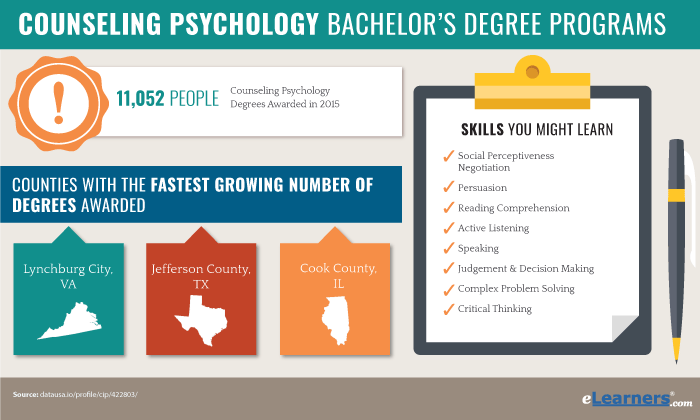Sponsored Online Programs Available
Bachelors in Counseling Online Programs & Schools
Earning a Bachelors Degree in Counseling Online, students may be able to hone the psychology expertise, compassion, and communication skills to help people thrive.
Bachelors programs often focus on establishing a grounding in psychology theory as it informs counseling practice. That could include discussing behavioral psychology, substance abuse, family dynamics, developmental psychology and more.
Moreover, counseling psychology bachelors programs may enable students to focus their studies on a specific issue or type of patient.
By offering these degrees online, counseling psychology schools are able to serve traditional and post-traditional students alike—meaning no matter what your lifestyle, you might find one that works for you.
Counseling vs. Psychology Programs
So you’re interested in learning how people think and process their feelings, and using that knowledge to help people. But with all the different, similar-sounding programs available—psychology, counseling, therapy—if you’re not sure of the difference, how do you know which one is perfect for you?
The differences between counseling, psychology, and therapy programs may, in some cases, vary based on the state in which they are based. That’s because different states may have different laws in place surrounding what types of professionals can use which title, and the qualifications they need to have to do so. That said, there are some general trends that can help you draw a clearer picture of what each title means—and, therefore, what that kind of program might entail.
Breaking Down the Differences
- Counseling: Counseling programs may focus on the collaborative relationship between the counselor and the patient. They might talk about how counselors and patients identify goals with respect to the patient’s personal challenges, trauma, or emotional issues, and how they strategize to achieve those goals. Counseling programs help students develop the skills to guide patients in that setting. They tend to spend less time and attention on clinical research, compared to psychology.
- Psychology: Psychology programs often place a greater emphasis on psychology research. That includes becoming fluent in research that has already been done, as well as practices for conducting it. Clinical psychology programs focus on leveraging that research to diagnose patients and recommend treatment plans. The “Psychologist” title generally refers only to those who have been licensed in their state to practice.
- Therapy: This term is a little more nebulous, as it could apply to either counseling or therapy programs. Therapy programs are generally not research-oriented, but rather focus on helping people. Often, you’ll see the term “therapy” in specific types of programs, like Marriage and Family Therapy, Behavioral Therapy, etc. The term’s usage in some cases could vary by state.
What to Expect in Earning a Bachelors in Counseling Online
Online bachelors degree in counseling programs often aim to establish a reliable grounding in psychology. That knowledge could then act as a foundation for counseling practice. In most cases, online counseling bachelors programs are also designed to prepare students for potential graduate study in a masters program, as most students interested in clinical practice are likely to consider attending one.
Because of this, many undergraduate counseling degree programs cross over with or are combined with psychology programs, enabling students to choose either path at the graduate level. As such, many online counseling bachelors programs emphasize psychology content as well as the basics of the counseling field. However, some programs may enable students to further tailor their study by concentrating on a certain patient type or area of practice.
Concentration Areas
While not every online counseling bachelors degree program offers concentration options, you might find yourself choosing between programs that offer them. Some programs might offer a suite of options. Others might center their curriculum on a single type of counseling.
Here are a few of the options you might find.
- Marriage & Family Counseling: These types of programs focus on healthy and unhealthy romantic and family relationships, and the different types of issues that could impact them. They may discuss counseling people in group settings, and helping people improve their interpersonal relationships or overcome relationship obstacles.
- Substance Abuse, Addiction, or Behavior Counseling: Broadly speaking, behavior counseling focuses on identifying unhealthy habits and behaviors and their causes, and helping a patient overcome them to develop healthier ones. Substance abuse and addiction counseling can be seen as a type of behavior counseling specifically concerned with chemical and psychological dependency.
- Trauma & Grief Counseling: Programs like this focus on learning how to help people cope with traumatic situations, or the loss of a loved one, in a healthy and constructive way. Topics touched on could include things like crisis intervention, PTSD, and different types of trauma scenarios.
Example Curriculum
While different online counseling psychology bachelors degree programs may vary, here’s a run-down of the types of courses you might expect to attend once you enroll in a program.
- Lifespan Development: This psychology course centers on how people grow and change from birth until death. Classes might discuss social, environmental, and economic factors and how they impact people’s development, as well as disabilities, education, family, trauma, and health issues.
- Personality Theory: Some courses may look at how personalities develop, change, and manifest. This includes discussing current and historical psychology research as it relates, as well as different modes of thinking surrounding that research.
- Abnormal Psychology: While they could go by other names, abnormal psychology courses focus on typical behavior and patterns, and how to identify patterns of behavior that deviate from that norm. This includes discussing anxiety, psychosis, depression, defense mechanisms, and other disorders, as well as psychoanalysis and methods of treatment.
- Introduction to Counseling: Most programs will include a course to lay a foundation of knowledge about counseling, to act as a basis for more advanced study throughout the program. This may include talking about the counselor-client relationship, ethical issues, major theories of treatment, and current issues in the field.
- Social Sciences Research: Counseling is in many ways interconnected with the rest of the social sciences. As such, some programs may help students develop fluency with how research is conducted in those related areas, as well as how to analyze and understand it.
- Social Policy: This type of course examines the relationship between social welfare—such as counseling—and government policy. Classes might discuss access to services, public programs and funding, poverty, and other issues.
- Counseling Strategies and Techniques: Courses like this focus on the different approaches people might take to counseling. One might discuss how to adjust counseling technique for different types of clients and in different scenarios, contrast counseling philosophies, and talk about potential challenges one may face.
- Family & Crisis Intervention: Family intervention centers on identifying problems within a family unit and intervene to help that family interact in a healthier way. Crisis intervention takes that to another level, discussing how to intervene in emergency situations, in family or individual scenarios. Often these would be split into separate courses.
Choosing an Online Bachelors Degree in Counseling
Deciding which online bachelors degree in counseling psychology to attend is a big decision. You have to identify potential schools, compare them, decide where to apply… and a lot of factors may go into that choice!
Here’s a list of things to consider during your search for an undergraduate degree in counseling.
- What type of counseling are you interested in?
Not all online bachelors in counseling psychology programs offer concentration options. However, that doesn’t mean your study couldn’t be geared toward your interests. Look into the curriculum of your potential programs. Do the courses not only support your goals, but also touch on what you’re most interested in learning about counseling? - Do you want to attend graduate school?
If you’re thinking about moving on to a masters program after you earn your bachelors degree in counseling, take that into consideration when choosing a program. How do the programs you’re looking at stack up against what your dream grad schools ask for - Is the online program accredited?
Most accrediting organizations within psychology and counseling focus on graduate programs rather than undergrad. As such, while you might not find an APA, COAMFTE, or CACREP-accredited bachelors program, you still might want to look into who does accredit your program. Especially if you want to attend graduate school later, you might want to earn your bachelors degree from a regional or nationally accredited institution. - Does it fit into your schedule?
Online study adds an element of flexibility you might not find in other types of programs. But that doesn’t mean every online program works for every student. Some may require students to log in at certain times and attend synchronous lectures, while others might give students broader freedom to work their classes into their schedules. If you’re studying online because you have hectic scheduling needs, make sure the program you choose would support your life. - Does it support you in the ways that you need?
Each online school may offer a different suite of services to support students. Those could range from career advisement to tutoring, online library services, tech support, and even social networking. Think about the types of services you need to succeed. Learning disabilities to accommodate, professional guidance, computer help? And then make sure the programs you’re looking at offer those things. - Are there any offline or in-person experiences?
Some otherwise online bachelors degree in counseling programs include in-person components—particularly field experience. That could include observing a professional at work in the field, or even some hands-on guided experience. On one hand, that could be a scheduling challenge for you if you chose online for the flexibility. On the other hand, it could be a valuable opportunity to contextualize your learning. Either way, be aware of whether your chosen programs include this requirement and take that into consideration.
What Next?
Many students who pursue a bachelors degree in counseling online go on to earn their masters degree in counseling so as to pursue licensure. Counseling masters programs may offer a spectrum of concentration options, including:
- trauma
- grief
- behavior
- substance abuse
- family and relationships
Often, they’re clinically-oriented, meaning they’re focused on preparing students to help clients in the field as a licensed counselor or therapist. The prerequisites to attend a masters program in counseling may vary, so if this is a path you think you want to take, talk to your academic counselor at your bachelors program of choice about what preparation you might need to take.
Bachelors in Counseling Careers
While most counseling careers require at least a masters degree for entry level employment, graduates holding a bachelors degree in counseling may have a number of options. On one hand, students could leverage their understanding of people in other careers in which they might work with people, such as in a business setting. But if you want more directly related experience, it may be possible to find entry-level employment with a bachelors degree.
For example, some substance abuse or behavior disorder counseling positions may be open to bachelors degree holders, though the degree level held may limit the scope of practice. Counseling psychology could also potentially be applied in the realm of social work.
Below are two examples of related positions that might be sought with a bachelors degree. (Bear in mind that individual employer expectations may vary, as might requirements in different states.)
- Substance Abuse and Behavioral Disorder Counselors: 2016 Median Pay $41,070i
- Social and Community Service Managers: 2016 Median Pay $64,640ii
Earn Your Bachelors Degree in Counseling Online
If you think you’re ready to start searching for your online bachelors degree in counseling program, eLearners is ready to help.
Check out the sponsored program listings on this page to get started! If you want to learn more or get in touch, click on “Request Info.”
[i] bls.gov/ooh/community-and-social-service/substance-abuse-and-behavioral-disorder-counselors.htm
[ii] bls.gov/ooh/management/social-and-community-service-managers.htm



